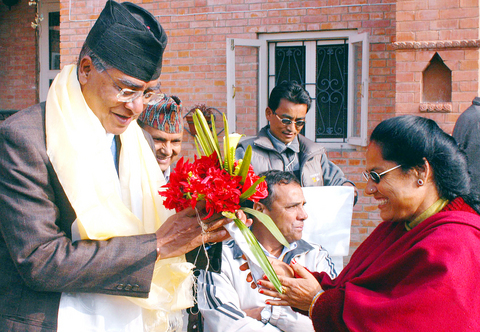Nepal's ousted premier was released from prison early yesterday, hours after the Supreme Court dissolved the royal anti-corruption body that jailed him, striking a blow against King Gyanendra's absolute rule.
Sher Bahadur Deuba was jailed for two years last July by a body established after the king sacked him as prime minister, kicked out his government and assumed total control on Feb. 1 last year.
Former minister for physical planning and works Prakash Man Singh, jailed for corruption at the same time as Deuba, was also freed, the local media reported.

PHOTO: AP
"I am very happy to have been released," Deuba told journalists waiting outside his home yesterday morning.
"The court's decision is good, and my release is a democratic step," he said.
Deuba said he would hold a press conference later in the day.
The Royal Commission for Cor-ruption Control was dissolved by the country's Supreme Court on Monday, when the country's top judges ruled that the establishment and operations of the body were unconstitutional.
The much-criticized commission against corruption was set up soon after Gyanendra assumed total control of the Himalayan kingdom.
Gyanendra said the takeover was necessary because the government was corrupt and had failed to tackle a 10-year Maoist insurgency.
Senior lawyer and former president of the Nepal Bar Association Sindhunath Pyakurel hailed the Supreme Court's decision, saying it had "established the supremacy of the Constitution and law in the country."
"It has given the message that the king must perform his duty and remain within the constitutional framework. He cannot stay on as chairman of the council of ministers," Pyakurel said.
"The verdict has given the indirect message to the king to correct his Feb. 1 move, which is against the spirit of the Constitution," he said.
Deuba, president of the Nepali Congress when he was jailed, had consistently said he was framed by the royal body, which also fined him US$1.26 million.
The alleged corruption related to the granting of a contract in a road building scheme that formed part of a US$464 million project to supply drinking water to the capital.
The Supreme Court ruling could pave the way for legal challenges of all decisions made by Gyanendra over the past year of his direct control, the Himalayan Times said in an editorial.
"The verdict has also set a precedent that any action of the monarch is subject to a test of constitutionality in the Supreme Court," the paper said.
"Some may interpret it as a political setback for the regime, while others may see in it a political thaw," it added.
The decision by the Supreme Court was a direct challenge to Nepal's beleaguered king, political analyst S.M. Habibullah said.
"It's a good sign because the judiciary has taken a step against the unconstitutional steps of the king. Because the king's power has been limited, this shows real rule of law," said Habibullah, head of political science at Tribhuvan university.
The six-member anti-corruption body was set up using emergency provisions of the Constitution, the news Web site Kantipur said.
Although the state of emergency imposed by Gyanendra was lifted in April, the commission was allowed to continue under a royal decree, the news portal reported.

A fire caused by a burst gas pipe yesterday spread to several homes and sent a fireball soaring into the sky outside Malaysia’s largest city, injuring more than 100 people. The towering inferno near a gas station in Putra Heights outside Kuala Lumpur was visible for kilometers and lasted for several hours. It happened during a public holiday as Muslims, who are the majority in Malaysia, celebrate the second day of Eid al-Fitr. National oil company Petronas said the fire started at one of its gas pipelines at 8:10am and the affected pipeline was later isolated. Disaster management officials said shutting the

US Vice President J.D. Vance on Friday accused Denmark of not having done enough to protect Greenland, when he visited the strategically placed and resource-rich Danish territory coveted by US President Donald Trump. Vance made his comment during a trip to the Pituffik Space Base in northwestern Greenland, a visit viewed by Copenhagen and Nuuk as a provocation. “Our message to Denmark is very simple: You have not done a good job by the people of Greenland,” Vance told a news conference. “You have under-invested in the people of Greenland, and you have under-invested in the security architecture of this

UNREST: The authorities in Turkey arrested 13 Turkish journalists in five days, deported a BBC correspondent and on Thursday arrested a reporter from Sweden Waving flags and chanting slogans, many hundreds of thousands of anti-government demonstrators on Saturday rallied in Istanbul, Turkey, in defence of democracy after the arrest of Istanbul Mayor Ekrem Imamoglu which sparked Turkey’s worst street unrest in more than a decade. Under a cloudless blue sky, vast crowds gathered in Maltepe on the Asian side of Turkey’s biggest city on the eve of the Eid al-Fitr celebration which started yesterday, marking the end of Ramadan. Ozgur Ozel, chairman of the main opposition Republican People’s Party (CHP), which organized the rally, said there were 2.2 million people in the crowd, but

JOINT EFFORTS: The three countries have been strengthening an alliance and pressing efforts to bolster deterrence against Beijing’s assertiveness in the South China Sea The US, Japan and the Philippines on Friday staged joint naval drills to boost crisis readiness off a disputed South China Sea shoal as a Chinese military ship kept watch from a distance. The Chinese frigate attempted to get closer to the waters, where the warships and aircraft from the three allied countries were undertaking maneuvers off the Scarborough Shoal — also known as Huangyan Island (黃岩島) and claimed by Taiwan and China — in an unsettling moment but it was warned by a Philippine frigate by radio and kept away. “There was a time when they attempted to maneuver